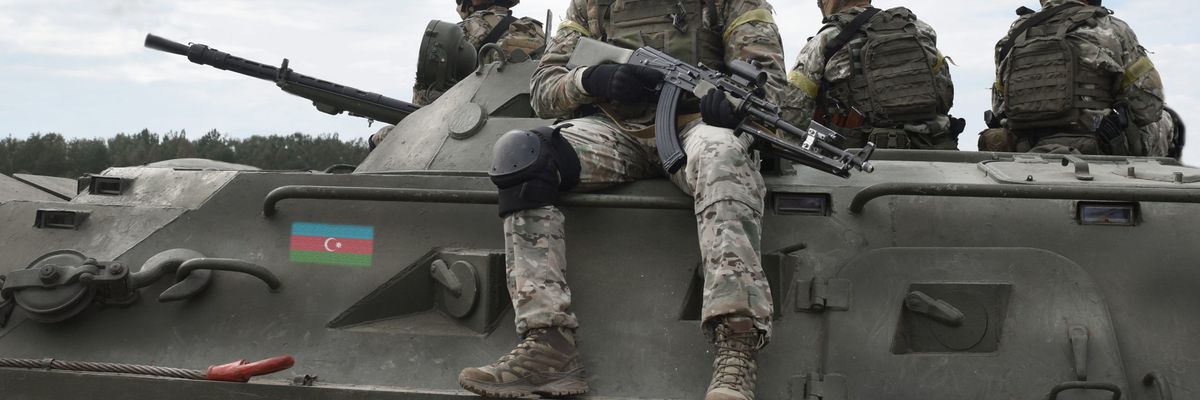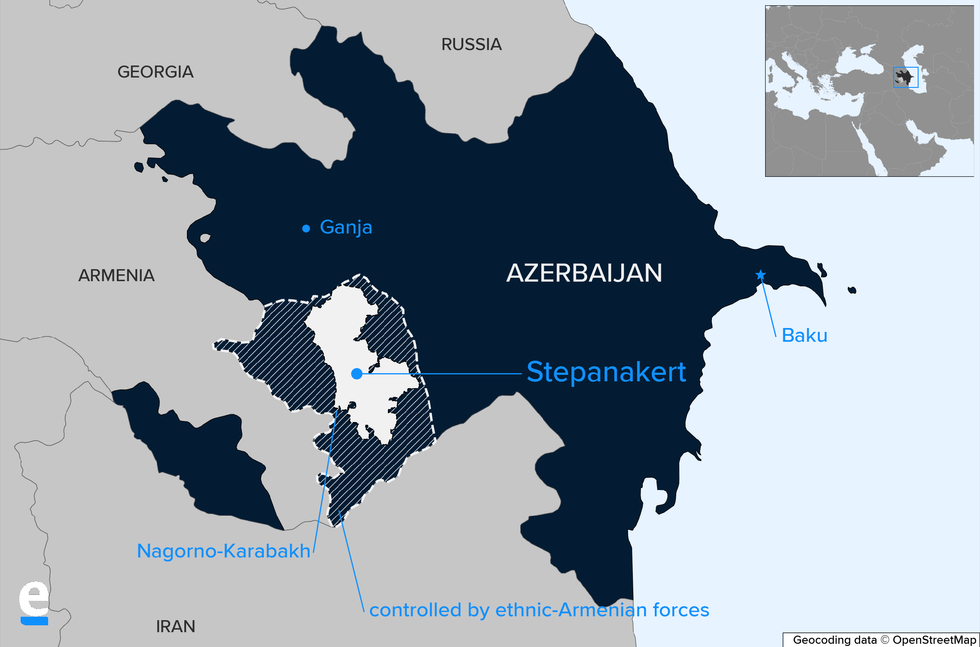On the first Friday after war resumed between Armenia and Azerbaijan over the disputed Nagorno-Karabakh region, four prayer leaders in Azerbaijani-majority regions of Iran issued a statement offering their full-throttled support for one side in the conflict.
They claimed that Karabakh is a “land of Islam,” and that Azerbaijan is fully entitled to “end its occupation” by the Armenians. The fact that these “emam-e jomehs,” or prayer leaders, are personal representatives of Supreme Leader Ayatollah Ali Khamenei ignited expectations in Baku and Ankara that Iran may be shifting its policy from neutrality to more explicitly supporting Azerbaijan.
Such hopes, however, may be ill-founded. Even though the statement was almost certainly cleared with Khamenei’s office, Iran’s foreign policy formulation is a complex process involving stakeholders from various diplomatic and security establishments. The Supreme Leader acts as the ultimate decision-maker on policies in terms of Iran’s national interests; he is not a unilateral executor.
Clerical pronouncements, therefore, may have a different function, such as appeasing people in Azerbaijani-majority provinces who may sympathize with their ethnic kin engaged in the battle across the border.
For a better guide to where Iran’s Nagorno-Karabakh policy is heading one might turn to Khamenei’s national security adviser Ali Akbar Velayati and government spokesman Ali Rabiei. Both have urged Armenia to withdraw its military forces from within Azerbaijan’s UN-recognized borders, but also stressed that this should be achieved only through peaceful means. Velayati introduced a significant nuance when he referred on October 6 to the UN Security Council resolutions of the early 1990s and the “Armenian occupation of seven cities” of Azerbaijan, referring to the seven districts surrounding Nagorno-Karabakh that are under Armenian control, but not part of the region of Nagorno-Karabakh itself.
A focus on these districts, and a studied ambivalence on the status of Nagorno-Karabakh, could be consolidating into Tehran’s position on the conflict. Yet Iran is walking a tightrope, and must balance relations with two key regional players deeply involved in the Nagorno-Karabakh conflict: Russia and Turkey.
Iran’s relations with Russia – Armenia’s top military ally – are multifaceted. Tehran depends on Russia’s support at the UN Security Council. The two cooperate in Syria, where they both back Bashar al-Assad, and Tehran hopes to resume Russian arms purchases once the UN embargo expires on October 18. As Iran’s bet on normalization with the U.S. and EU failed to materialize after the 2015 nuclear agreement, its reliance on Russia and China increased.
Iran also has wide-ranging interests in Turkey, Azerbaijan’s chief backer. Tehran and Ankara work together against the Kurdish insurgency they both see as threatening. They face the same regional rivals – Israel, the United Arab Emirates and Saudi Arabia. Turkey is an important trade partner and useful conduit for mitigating the effects of unilateral U.S. sanctions. At a time when Iran is being squeezed by the Trump administration’s “maximum pressure” campaign and an array of regional rivalries, it can hardly afford to alienate Turkey.
The longer, however, the Armenia-Azerbaijan conflict drags on, the chances rise that Iran will play a more assertive role.
To Tehran, the most dangerous development would be an expansion of Turkish and Israeli presence on its northern borders. Israeli security analysts may consider Turkey a growing long-term threat, but they still see Iran as an immediate problem. Azerbaijan already enjoys close security cooperation with Israel, therefore Tehran is concerned that an outright Azerbaijani win at the expense of Armenia would widen Israel’s reach in Iran’s immediate neighborhood.
Iran’s concerns are exacerbated by the fact that the fighting is happening only a few kilometers from Iranian regions dominated by ethnic Azerbaijanis. Neoconservative circles in the U.S. and Israel have long sought to fuel Azerbaijani irredentism and hasten Iran’s “balkanization.”
A prolonged conflict would also offer pan-Turkic agitators in Baku and Ankara an opportunity to pursue dreams of cleaving Iranian Azerbaijan from Iran. So far, only an insignificant minority of Iranian Azerbaijanis reportedly share separatist inclinations, but the conflict risks fueling the overall sense of Turkic grievance and solidarity that, with time, could weaken Iran’s national cohesion.
That would endanger the culture of co-existence between Azerbaijanis and Armenians in Iran. Some of the most significant Armenian churches are, interestingly, located in Azerbaijani-majority regions, and currently operate without trouble. This tolerance is an important element of Iranian self-perception and helps boost the country’s image abroad. The spread of Azerbaijani ethnic nationalism inside Iran could add strain to domestic politics and international relations.
Reports about Turkey sending Syrian jihadist mercenaries to the Karabakh front pose an additional challenge to Iran, as these are the kind of forces that Iran fights in Syria.
So, the combined risks of Turkish and Israeli encroachments on Iranian borders, Syrian extremist penetration and internal Azerbaijani agitation are factors that have the potential to cause what Maysam Behravesh, a former intelligence analyst and security policy adviser in Iran, calls a “security breach” on Iran’s hitherto stable northern flank.
It is in this context that Velayati and, on October 7, Iran’s President Hassan Rouhani have admonished Turkey not to pour more fuel on the fire, and warned that Iran’s patience has limits. We can therefore expect that Iran will step up its diplomatic engagement toward a ceasefire and push hard for negotiations between belligerents, while in parallel boosting security on its northern borders.
This article has been republished with permission from Eurasianet.

















